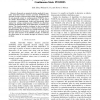121
click to vote
NIPS
2003
15 years 3 months ago
2003
Recent research has demonstrated that useful POMDP solutions do not require consideration of the entire belief space. We extend this idea with the notion of temporal abstraction. ...
AAAI
2004
15 years 3 months ago
2004
We present a general framework for studying heuristics for planning in the belief space. Earlier work has focused on giving implementations of heuristics that work well on benchma...
113
click to vote
NIPS
2007
15 years 3 months ago
2007
Point-based algorithms have been surprisingly successful in computing approximately optimal solutions for partially observable Markov decision processes (POMDPs) in high dimension...
107
click to vote
AIPS
2008
15 years 4 months ago
2008
High dimensionality of belief space in DEC-POMDPs is one of the major causes that makes the optimal joint policy computation intractable. The belief state for a given agent is a p...
108
click to vote
ISIPTA
2003
IEEE
15 years 7 months ago
2003
IEEE
In this paper we adopt the geometric approach to the theory of evidence to study the geometric counterparts of the plausibility functions, or upper probabilities. The computation ...
CDC
2008
IEEE
15 years 8 months ago
2008
IEEE
Abstract— Research on numerical solution methods for partially observable Markov decision processes (POMDPs) has primarily focused on discrete-state models, and these algorithms ...


